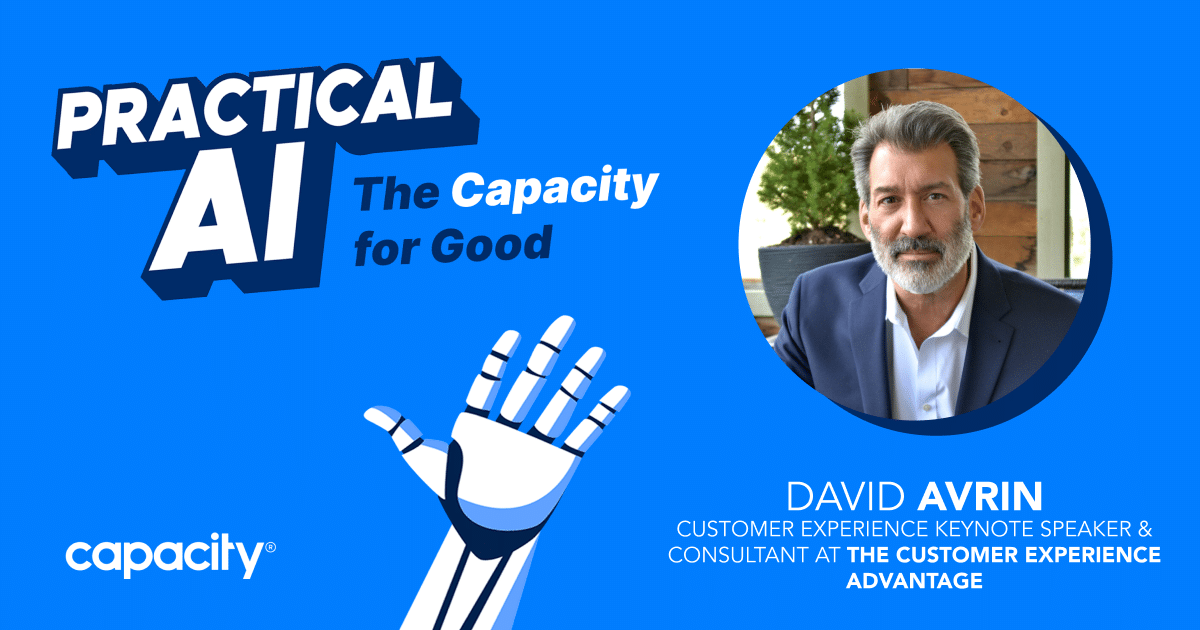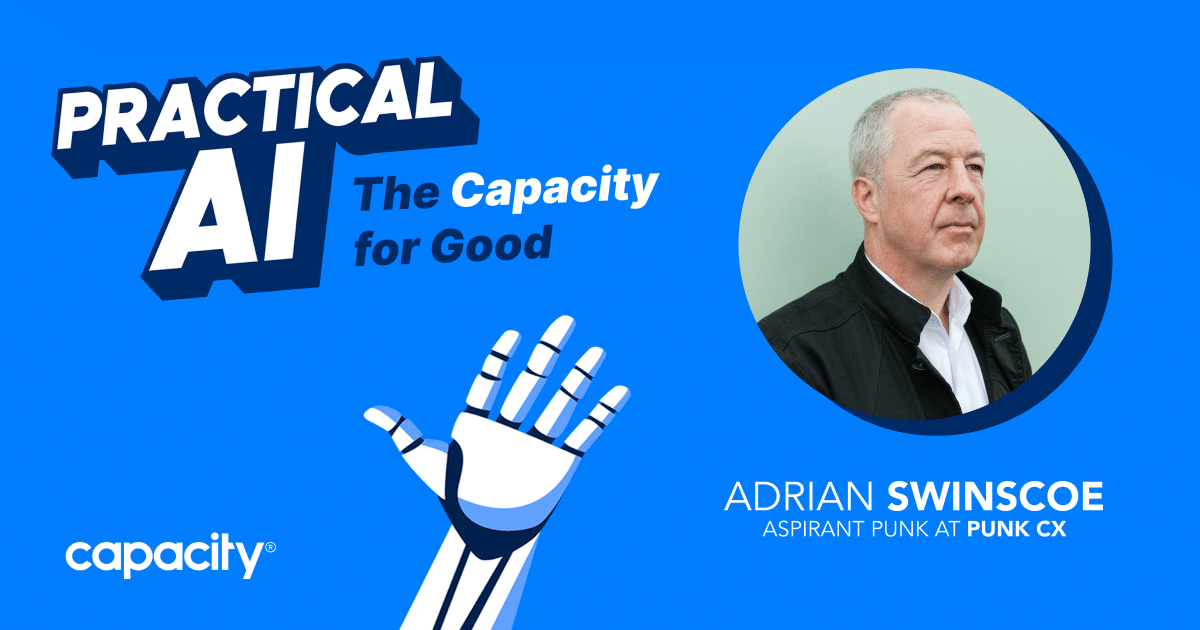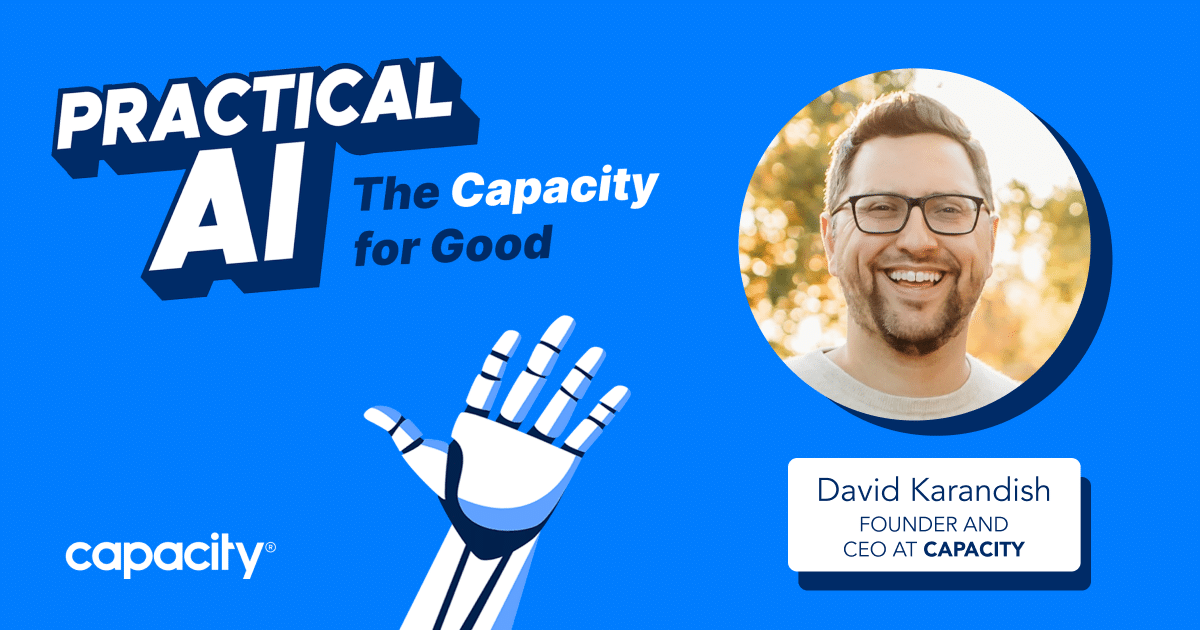Digital transformation dictates the future, and the healthcare sector is ripe for an upgrade. In fact, only 7% of healthcare and pharmaceutical companies said they had gone digital. Compare that to 15% of companies in other industries. The healthcare industry needs to catch up.
Picture a seamless interaction between healthcare providers and patients. Or imagine a world where accessing healthcare becomes as easy as asking a question to an AI chatbot. What if you could get medical help within minutes?
By introducing intuitive interactions between humans and machines, conversational AI technology revolutionizes healthcare. Conversational AI makes healthcare more accessible, personalized, and efficient than ever before.

Automate Your Work
Capacity’s enterprise AI chatbot can help:
- Answer FAQs anytime, anywhere
- Find relevant documents within seconds
- Give surveys and collect feedback
What is conversational AI in healthcare?
Conversational AI is an advanced technology that facilitates human-like interactions between humans and bots. And in the healthcare industry, it’s transforming everything.
Conversational AI offers instant, personalized responses to a variety of medical queries. With it, you can make healthcare more accessible and efficient.
Think about it as the always-available, ultimate healthcare companion. It’s not your traditional chatbot. Conversational AI understands, learns, and responds to patients in real-time. In turn, medical professionals are free to focus on patients with more pressing needs.
How conversational AI fits in the healthcare industry
Even in healthcare, AI has a place. Leading healthcare providers can use conversational AI to streamline internal and external support. It also aids nurses in triage. It can help patients navigate complex insurance policies. And it even provides critical mental health support. The benefits are far-reaching.
Let’s say your heart is racing, and you’re feeling achy. Naturally, you want to know whether you should be concerned. But when you go to call your doctor, the line is busy. Should you call for an ambulance? Or do you only need to drink a glass of water? It would be nice to know — and fast.
With conversational AI, healthcare professionals can provide patients with fast help. Patients appreciate the instant, round-the-clock availability. Healthcare professionals love added efficiency, freeing them to focus more on patient care. Organizations are enjoying cost savings and improved customer satisfaction. Everyone wins!
Conversational AI in healthcare is more than a possibility. It’s a current reality, making a difference today. And with advancements in AI technology, the future looks brighter than ever.
Use examples of conversational AI healthcare
Let’s take a glimpse into this new era. Imagine Jane, a patient who recently received a diagnosis of diabetes. She’s overwhelmed and has dozens of questions. Enter our AI chatbot healthcare assistant.
The AI chatbot is there for Jane. It’s available 24/7 to provide valuable, digestible information on managing her condition. It even offers nutritional advice and exercise suggestions. That’s conversational AI at work.
Or consider a busy nurse juggling several tasks. Conversational AI enters to handle routine administrative tasks. The busy nurse can let the bot schedule appointments and manage medication reminders. Now, the nurse has more time to offer personalized patient care. The value of conversational AI in healthcare is immense and evident.

Other innovative applications of conversational AI in healthcare
The magic of conversational AI in healthcare is more than answering patients. The scope is much broader. And the applications are downright innovative.
- Mental health support. AI chatbots are becoming accessible, non-judgmental outlets for people to express their feelings. These bots are programmed with cognitive behavioral therapy techniques, providing instant therapeutic responses.
- Chronic disease management. Conversational AI can help manage chronic diseases. They’ll send medication reminders, provide dietary advice, and even offer exercise suggestions. It’s like having a personal health coach, all aimed at improving the quality of life.
- Triage. Yes, AI can assist there too. It can help gather an initial assessment of patient symptoms. Then, it can direct them to the most suitable care setting. That’s not just efficient; it’s life-saving.
- Medical research. Conversational AI sifts through vast databases, spotting patterns and connections. This quick analysis could speed up drug discovery and contribute to advancing medical knowledge.
These are only a few examples of the creative ways you can use conversational AI in healthcare. The possibilities seem endless, don’t they?

The impact of conversational AI on patient engagement
The influence of conversational AI on patient engagement is profound. Conversational AI is reshaping how patients interact with the healthcare system. The result? A more engaged, informed, and satisfied patient population. Here is how conversational AI impacts patient engagement:
- It makes healthcare more accessible. Patients can get relevant health information by getting instant, personalized responses to queries. This ease of access empowers them to take charge of their health. Promote more proactive engagement with AI.
- It enhances communication. Through AI chatbots, patients can clarify doubts and seek advice. Help them bypass the hassle of long waits and schedule appointments faster. Streamlining communication reduces barriers. So then, patients are more likely to reach out when they need help.
- It tailors healthcare experience. AI can provide personalized advice and recommendations. AI understands and learns from each interaction. So with it, patients get more personal care over time. In the end, patients feel valued and understood, further boosting their engagement.
- It sends reminders for medication or scheduled appointments. Conversational AI helps patients adhere to their treatment plans. It’s like a gentle nudge, assisting patients to stay on track with their health goals.
Conversational AI, in essence, enhances the patient experience. It promotes active participation in healthcare and fosters a stronger patient-provider relationship. It’s a promising tool for advancing patient engagement in our evolving healthcare landscape.
The top 5 benefits of conversational AI
There are loads of benefits to conversational AI in healthcare, but we’ve narrowed it down to these top 5.

1. 24/7 Accessibility
One of the most significant advantages of conversational AI is its round-the-clock availability. No holidays, no off-hours. And it’s always ready to provide instant, accurate responses to patient queries. It’s like having a healthcare assistant on call all the time.
2. Improved efficiency
Chatbot healthcare takes over routine administrative tasks like appointment scheduling or medication reminders. This results in an enormous efficiency boost. And it allows healthcare professionals to concentrate on what matters most: patient care.
3. Personalized care
Every interaction with an AI chatbot contributes to its understanding of the patient. It learns, adapts, and offers personalized advice. In effect, the care experience becomes as unique as the individual receiving it.
4. Cost savings
Conversational AI reduces the time and resources spent on administrative tasks. With it, your team can save on costs. It’s an investment that pays for itself and then some!
5. Enhanced patient satisfaction
With instant, accurate responses and personalized care, patient satisfaction soars. It’s a win-win situation for everyone involved in the healthcare process.
Challenges and solutions of conversational AI healthcare
Of course, adding tech always has its complications. And in the healthcare industry, it’s more important than ever to be cautious in how you use technology. To help you stay alert, here are a few challenges (and their solutions) to conversational AI in healthcare:

Data Privacy:
Securing sensitive health data is paramount. (Especially in an age where data breaches are more and more common.)
Solution
Employ stringent data encryption techniques and robust privacy policies to ensure data safety.
Potential Misinformation:
The risk of inaccurate information is real. And in the healthcare setting, inaccuracies could have severe implications.
Solution
Rigorously train your AI. Use verified medical databases to get it up to speed and ensure the information provided is accurate and up-to-date.
Technical Hurdles:
Not everyone is technologically savvy. For some, using an AI chatbot might pose a challenge.
Solution
User-friendly design and simple instructions can go a long way in overcoming this hurdle.
Perceived Impersonality:
Some might perceive the AI interaction as cold and impersonal.
Solution
With Natural Language Processing (NLP), we can make conversational AI interactions more human-like. The more human your conversational AI, the more comforting the customer experience.
Constant Learning and Adaptation:
The world of healthcare is evolving, and AI needs to keep pace.
Solution
Stay on top of updates. Use continuous learning modules to ensure the AI stays relevant and in tune with the latest medical knowledge.
Capacity – The best platform for the implementation of conversational AI in healthcare
When implementing conversational AI in healthcare, not all platforms are equal. Allow me to introduce you to a game-changer: Capacity.
Capacity is an AI-powered support automation platform transforming how healthcare organizations operate. Picture this: an intelligent system that connects your entire tech stack. It’s capable of answering questions. It automates repetitive tasks. And it crafts solutions to your unique business challenges.

Automate Your Work
Capacity’s enterprise AI chatbot can help:
- Answer FAQs anytime, anywhere
- Find relevant documents within seconds
- Give surveys and collect feedback
What sets Capacity apart is its low-code platform, accessible through conversational AI. It combines the best of both worlds: automation and human interaction. Capacity facilitates seamless human handoffs and intuitive task management. It does so with a robust workflow automation suite, a developer platform, and a flexible database.
Here’s what Capacity can do for healthcare teams:
- Answering FAQs. Capacity can tackle over 90% of your FAQs via an all-in-one helpdesk. Reduce the tickets in your support team’s queue with Capacity.
- Automating Tasks. With Capacity’s low-code workflows, you can automate tedious processes to enhance team productivity. Less time on repetitive tasks means more time for patient care.
- Empowering Employees. Capacity offers an easy-to-use knowledge base. You also get a suite of app integrations and a conversational interface. With Capacity, empower your employees to deliver better patient care by giving them access to vital information.





